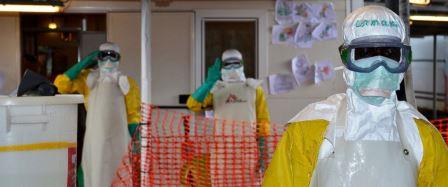You are here
World Health Organization Declares End of Ebola Virus in Guinea
Primary tabs
The World Health Organization (WHO) declared the Republic of Guinea Ebola-free today.
"Forty-two days have passed since the last person confirmed to have Ebola virus disease tested negative for the second time," WHO said in a statement. "Guinea now enters a 90-day period of heightened surveillance to ensure that any new cases are identified quickly before they can spread to other people.”

This would be the second such declaration from the country at the epicenter of the world's worst outbreak of the disease.
The WHO had previously announced Guinea was free of transmission in December, after 42 days had passed without a positive test.
publish - By BRIAN MCBRIDEJun 1, 2016,
see more at: http://abcnews.go.com/International/world-health-organization-declares-end-ebola-virus-guinea/story?id=39520887



Comments
WHO - End of Ebola Transmission in Guinea
who.int
Brazzaville, 1 June 2016 - Today the World Health Organization (WHO) declares the end of Ebola virus transmission in the Republic of Guinea. Forty-two days have passed since the last person confirmed to have Ebola virus disease tested negative for the second time. Guinea now enters a 90-day period of heightened surveillance to ensure that any new cases are identified quickly before they can spread to other people.
“WHO commends the Government of Guinea and its people on ending this Ebola outbreak,” says Dr Abou Bekr Gaye, acting WHO Representative in Guinea. “We must continue to be vigilant to ensure that we rapidly detect and stop any new cases that may occur.”
In the latest outbreak, 7 confirmed and 3 probable cases of Ebola virus disease were reported between 17 March and 6 April in Guinea. In addition, 3 confirmed cases were reported between 1 and 5 April in a woman and her two children who had travelled from Macenta, Guinea, to Monrovia, Liberia.
The source of infection in this latest outbreak is likely to have been due to exposure to infected body fluid from an Ebola survivor. The risk of additional outbreaks from exposure to infected body fluids of survivors remains.
WHO and partners are working with the Governments of Liberia, Sierra Leone and Guinea to help ensure that survivors have access to medical and psychosocial care, screening for persistent virus, as well as counselling and education to help them reintegrate into family and community life, reduce stigma and minimize the risk of Ebola virus transmission.
WHO is supporting the three most-affected countries to strengthen key public health programmes, especially maternal and child health, while continuing to maintain the capacity to detect, prevent and respond to any flare-up of Ebola.
(CLICK HERE FOR CONTACTS AND ADDITIONAL INFORMATION)